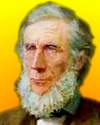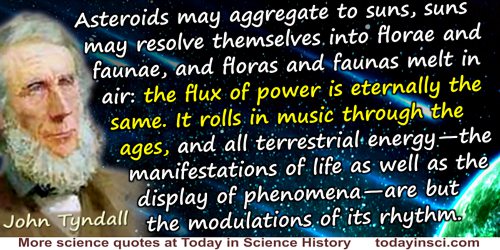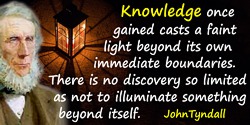 (source)
(source)
|
John Tyndall
(2 Aug 1820 - 4 Dec 1893)
Irish physicist who demonstrated why the sky is blue. He wrote on diverse topics, including crystals, glaciers and radiation. His studies also included spontaneous generation, the germ theory of disease and ozone.
|
John Tyndall Quotes on Wave (4 quotes)
>> Click for 48 Science Quotes by John Tyndall
>> Click for John Tyndall Quotes on | Experiment | Fact | Faraday_Michael | Life | Michael Faraday | Nature | Number | Observation | Phenomenon | Power | Science | Truth |
>> Click for 48 Science Quotes by John Tyndall
>> Click for John Tyndall Quotes on | Experiment | Fact | Faraday_Michael | Life | Michael Faraday | Nature | Number | Observation | Phenomenon | Power | Science | Truth |
Life is a wave, which in no two consecutive moments of its existence is composed of the same particles.
— John Tyndall
In 'Vitality', Scientific Use of the Imagination and Other Essays (1872), 62.
Religious feeling is as much a verity as any other part of human consciousness; and against it, on its subjective side, the waves of science beat in vain.
— John Tyndall
In 'Professor Virchow and Evolution', Fragments of Science for Unscientific People (1879), Vol. 2, 376.
The law of conservation rigidly excludes both creation and annihilation. Waves may change to ripples, and ripples to waves,—magnitude may be substituted for number, and number for magnitude,—asteroids may aggregate to suns, suns may resolve themselves into florae and faunae, and florae and faunae melt in air,—the flux of power is eternally the same. It rolls in music through the ages, and all terrestrial energy,—the manifestations of life, as well as the display of phenomena, are but the modulations of its rhythm.
— John Tyndall
Conclusion to lecture 12 (10 Apr 1862) at the Royal Institution, collected in Heat Considered as a Mode of Motion: Being a Course of Twelve Lectures (1863), 449.
To Nature nothing can be added; from Nature nothing can be taken away; the sum of her energies is constant, and the utmost man can do in the pursuit of physical truth, or in the applications of physical knowledge, is to shift the constituents of the never-varying total. The law of conservation rigidly excludes both creation and annihilation. Waves may change to ripples, and ripples to waves; magnitude may be substituted for number, and number for magnitude; asteroids may aggregate to suns, suns may resolve themselves into florae and faunae, and floras and faunas melt in air: the flux of power is eternally the same. It rolls in music through the ages, and all terrestrial energy—the manifestations of life as well as the display of phenomena—are but the modulations of its rhythm.
— John Tyndall
Conclusion of Heat Considered as a Mode of Motion: Being a Course of Twelve Lectures Delivered at the Royal Institution of Great Britain in the Season of 1862 (1863), 449.
See also:
- 2 Aug - short biography, births, deaths and events on date of Tyndall's birth.
- John Tyndall - context of quote “Fatal…to blink facts” - Medium image (500 x 250 px)
- John Tyndall - context of quote “Fatal…to blink facts” - Large image (800 x 400 px)
- John Tyndall - context of quote “The First Experiment a Child Makes” - Medium image (500 x 250 px)
- John Tyndall - context of quote “The First Experiment a Child Makes” - Large image (800 x 400 px)
- On Matter and Force - John Tyndall’s Lecture to general public at Dublin (1867).
- A Vision of Modern Science: John Tyndall and the Role of the Scientist in Victorian Culture, by Ursula DeYoung. - book suggestion.




 In science it often happens that scientists say, 'You know that's a really good argument; my position is mistaken,' and then they would actually change their minds and you never hear that old view from them again. They really do it. It doesn't happen as often as it should, because scientists are human and change is sometimes painful. But it happens every day. I cannot recall the last time something like that happened in politics or religion.
(1987) --
In science it often happens that scientists say, 'You know that's a really good argument; my position is mistaken,' and then they would actually change their minds and you never hear that old view from them again. They really do it. It doesn't happen as often as it should, because scientists are human and change is sometimes painful. But it happens every day. I cannot recall the last time something like that happened in politics or religion.
(1987) -- 


